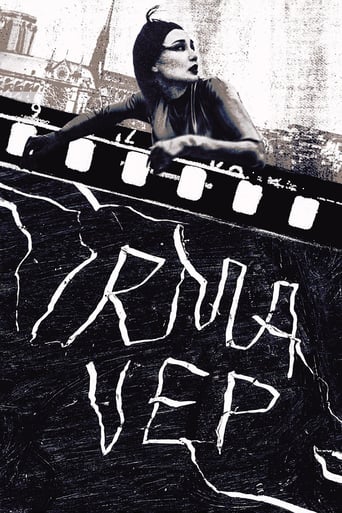sansay
I just watched Irma Vep last night. And I have to say that I enjoyed watching this movie for many reasons. Evidently Maggie is one of the reasons. Beautiful of course and good actress to boot. But beyond that, we have a lot of other things that kept my interest alive all along. This movie presents a self examination of French movie making, thereby justifying the accusation of "nombrilisme" (narcissism) by the reporter interviewing Maggy. This seems to be one of the themes here. A close look at the movie making process in France where a certain lack of coordination seems to be the rule, where a director launches the movie making only based on a whim. And in this case, it's the idea of having Maggie Cheung play the main role of a character in a remake of a 1915 silent movie. What really becomes interesting is the way she gets into the role and really becomes Irma. But I will leave you to discover how and when. At any rate, the movie has the funny effect to make you wonder if French movie making is in that bad a state that it can come up with such an interesting product.
MartinHafer
As mentioned above, this movie is about a movie being made and at times it's an example of how NOT to make a film. In particular, the director, played by Jean-Pierre Léaud, is teetering on the edge of a nervous breakdown and his decisions seem a bit strange to say the least. In particular, he paid to have an Asian actress, Maggie Cheung, fly all the way to Paris to star in his remake of the silent film IRMA VEP. The problem is, Ms. Cheung speaks excellent English (having lived much of her life there) and excellent Chinese--but NO FRENCH!! And the film is generally shown from her point of view--often feeling baffled and at a loss to cope with a new country, a new language and a new way of making films. This is a very interesting thing to behold (her viewpoint plus the film-making process) and somehow the movie really held my interest.Interestingly enough, this film is highly reminiscent of the Truffaut film, DAY FOR NIGHT, which also starred Jean-Pierre Léaud--though this time he played an actor not a director. Although I have loved him in many of his films (in particular, his "Antoine Doinelle" films for Truffaut), he was a bad choice for this film because his command of English isn't extraordinary. In fact, his accent was very thick and he really needed to be captioned--I really struggled to keep up whenever he was speaking. Unfortunately, NEW YORKER VIDEO, does NOT give you any captioning choices! In addition, the DVD has no extras--and this is a shame.Finally, the ending may satisfy some but I can guarantee many will feel a little flat at the film's conclusion. I liked what you are shown but felt there should have been just a little more to tie it together a little better.By the way, don't tell my wife I wrote this, but Maggie Cheung was really, really hot in this film.
jandesimpson
The only moment when I can confidently relate to what is going on in "Irma Vep" is when a character asks why such well made original films need to be remade. The turkey graveyard is littered with examples such as "Stagecoach", "Shadow of a Doubt", "Psycho" and most needlessly of all "Cry, the Beloved Country". Having, admittedly, only sat through half of Olivier Assayas's tedious French offering, I am minded to ask a different question but one that I imagine has the same answer. What is the point of making a film about making a film? The results are generally pretty dull. Even some of the great have come unstuck. Truffaut's "Day for Night", although not entirely without interest, is hardly among his best work, likewise Fellini's "Otto e Mezzo" about a film maker suffering from a creative block. I can only imagine that he had to get uncertainties out of his system that would enable him to go on to such wondrous stuff as "Amarcord". But does this justify such a monumental work of self-indulgence? The genre defeated Bertrand Tavernier whose "Laissez-Passer" has to be counted among French cinema's greatest yawns. But at least I sat it out in the belief that in its attempt to create a period of history so meticulously - French cinema making during the German occupation of Paris - it came into the worthy if dull category. I found no such saving grace in what little I saw of "Irma Vep". I think that, like remakes, such works are the result of their creators' desire to let us know they are still around during times of inspirational sterility. Surely the worthy thing for a director of integrity to do during such periods is to shut up.
jngarciauaf
This is a French film about French film makers who spend a lot of time B*tching about French film making while remaking a French silent film using a lead actress who doesn't speak French. It could be a slightly better movie but it has several moments where it lapses into Ibsenesk side commentary that doesn't really move the film any. It could have been better and it could have been worse.






